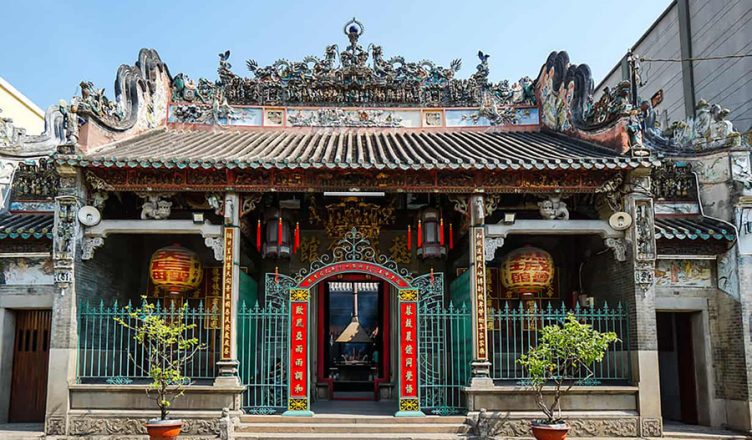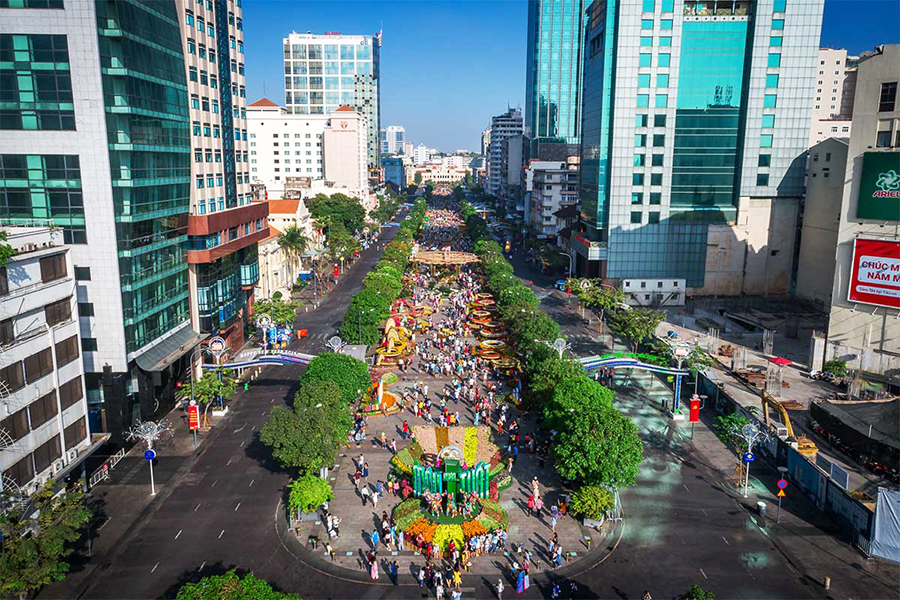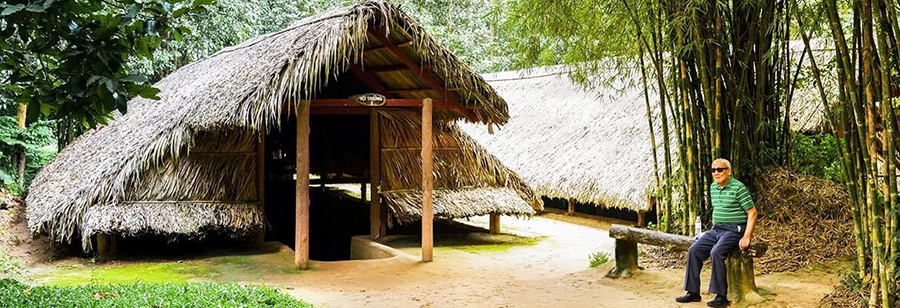Thien Hau Pagoda is the most well-known sacred site in the heart of prosperous Ho Chi Minh City. It is one of the oldest, largest, and most beautiful structures built by the Hoa people. Local folks have been coming here to seek blessings and peace for hundreds of years, making it more than just a historical relic. Read this article and let us take you on a trip to this sacred location!
Where is Thien Hau Pagoda?
- Location: 710 Nguyen Trai Street, Ward 11, District 5, HCMC
- Entrance fee: Free
- Opening hours: 6 AM – 11:30 AM, 1 PM – 4:30 PM

For many, a trip to Saigon means shopping until you drop, indulging yourself at lavish rooftop bars, and rocking the dance floors. It is the commercial capital of Vietnam, after all, and it doesn’t hurt to go the whole hog here.
But eventually, you may want to take a break from all the crowds and parties. At that point, the wise and well-informed will head to 710 Nguyen Trai Street, Ward 11, District 5. Nestled in the heart of Chinatown Ho Chi Minh, Thien Hau Pagoda exudes a sense of tranquility that cannot be found anywhere else.
History of Thien Hau Pagoda
To explore the rich history of the site, let’s trace it back to the 17th century. After fleeing the Vietnamese civil war in Cu Lao Pho, a group of Chinese ethnics found their new home in Cho Lon (now Saigon’s districts 5, 6, 10, and 11). Soon enough, the Chinese started to build local markets and temples to support and manage their businesses.

The Thien Hau temple is one of the legacies they left behind. The locals refer to this place as “Thien Hau Mieu,” which literally means a shrine dedicated to Thien Hau Thanh Mau (Thien Hau Mother).
According to Chinese mythology, it is Thien Hau Mother who bestows health and prosperity on sailors and seafarers. The immigrants believed that they received her protection during their journey to a new land – Vietnam.
Nowadays, Ba Thien Hau pagoda still has a strong impact on the religious life of Saigonese. On special occasions (like the full-moon day or Lunar New Year), locals and tourists alike come here to pray for safety and find peace of mind.
- Maybe you are interested in featured tours in Ho Chi Minh City, such as Saigon Tour Package 6 Days, Ho Chi Minh Tour Package 5 Days, Ho Chi Minh Muslim Tour 5 Days, South Vietnam Tour 5 Days.
Architecture of Thien Hau Pagoda
Years have passed, and the Thien Hau Pagoda has gone through numerous renovations and restorations. Yet, this place still maintains its original design and construction, with a unique architecture that reflects Chinese culture.

Walking through the exquisitely painted gate, visitors will be impressed with the seal-shaped structure, which features three main halls: the front, the central, and the back. This stays true to the architectural standards of ancient Chinese temples.
There are open spaces between each hall, allowing the sun to shine through every corner of the building.
The front hall
Greeting you in the front hall are two altars: On the left is Phuc Duc Chanh – the locality guardian, and on the right is Mon Quan Vuong Ta – the door god. These deities are inscribed with the tale of Thien Hau Mother. You can also see large paintings that depict her in goddess form, as well as stone steles recording the story of her life.

The central hall
The central hall of Thien Hau Pagoda boasts a set of five urns named “Phat Lan.” These elegantly sculptured relics date back to 1886. On their two sides are ancient palanquins and gold-plated dragon boats – symbols of good fortune and safety for fishermen.

The back hall
Right in the middle of the back hall is a huge statue of Thien Hau Lady. This work of art was carved from a one-meter-tall wooden block years before the temple’s construction.
Accompanying her are statues of two aquatic goddesses, Kim Hoa Nuong Nuong on the right and Long Mau Nuong Nuong on the left. All of them are dressed in exquisite embroidery.
In the same hall, the locals also worship the God of Earth (Tho Dia) and the God of Wealth (Than Tai).
Looking up at the ceiling, you will see many incense rings hanging overhead. To pray to Thien Hau Lady, visitors can buy a ring, write down their wishes on a piece of paper, and then hang it up with incense sticks. The Chinese believe that, by doing so, their prayers will come true.

- Besides the Thien Hau pagoda, you can take your time to visit other attractions of Ho Chi Minh, such as War Remnants Museum, Cu Chi Tunnels, Independence Palace, Notre Dame Cathedral, Saigon Central Post Office, Ben Thanh Market, etc.
What are the precious treasures kept at Thien Hau Pagoda?
The architecture of Thien Hau Temple Saigon is not the only fascinating thing about this location. When you go on a pagoda tour, you will be amazed by its vast collection of more than 400 artifacts from the 18th to the 20th centuries. This includes
- 7 meticulously crafted sculptures of deities
- 6 stone statues
- 9 stone steles
- 2 big ancient bronze bells
- 41 embossed paintings

Those are just a fraction of what you will see. All of these treasures have been well preserved throughout the years and still maintain their intricate details. They will give you a glimpse of the Hoa artisans’ valuable presents.
Thien Hau Pagoda Map
How to get to the Thien Hau pagoda?
As mentioned, Thien Hau Pagoda is located in District 5, just a few minutes from the city center. Hence, getting there is quite convenient. From Nguyen Thi Minh Khai, you can go straight to Hung Vuong and Hong Bang, then turn left on Luong Nhu Hoc street.
Tourists have three travel options to choose from:
- Travel by motorcycle: By renting a motorbike, you can explore the site and other attractions nearby like a local.
- Travel by taxi: Reputable taxi services include Mai Linh and Vinasun.
- Book transportation services using mobile applications: We would recommend booking a ride from Grab or Go Viet.
Also, Thien Hau temple hours of operation are 6 AM–4:30 PM. Keep that in mind so you can make a proper plan for your trip!

For tourists who want to visit the Thien Hau Pagoda with private services, you can book a private tour from Vietnam Shore Excursions. Professional and knowledgeable tour guides will share profoundly many interesting stories about this place and Ho Chi Minh City, as well as the local life of local people during the tour. Here are some Ho Chi Minh Tours which customers can find out and book for you and your group.
- Ho Chi Minh City Shore Excursions
- Ho Chi Minh City Tour
- Ho Chi Minh Half Day Tour
- Ho Chi Minh Cu Chi Tunnels Tour
- Ho Chi Minh City Jeep Tour
What to experience at the pagoda?
By visiting Thien Hau Pagoda, you can explore another facet of Ho Chi Minh City. Right from the gate, visitors will get lost in the sense of calmness and serenity, which stands in stark contrast to the urban’s hustle and bustle rhythm.
Thanks to its special architecture, each corner of the temple has a unique charm that steals the hearts of tourists. This is truly an ideal place for a photoshoot: even a simple brick wall can add the right amount of nostalgia to your photos, and the mystic atmosphere that characterizes the building will make them stand out.

The temple welcomes visitors all year round. If you are interested in the locals’ cultures and customs, though, you should drop by on March 23rd of the lunar month.
During this time, the biggest traditional festival in southern Vietnam takes place. To honor Thien Hau Lady, the locals will carry her statue around the temple on a palanquin. What’s more, tourists can revel in colors and sounds as they enjoy exciting activities such as lion dance, dragon dance, and live performances from traditional musical bands.

Those who just want to admire the architecture in silence can visit Thien Hau Temple Ho Chi Minh City in the remaining days. Simply light up an incense stick and pray for blessings on your loved ones—that’s how you experience a Vietnamese cultural quintessence.
Some Note before Visiting Thien Hau Pagoda
- Since Thien Hau Temple is a sacred place, you should avoid wearing clothes like tennis skirts, shorts, or sleeveless tops. The rule of thumb is to cover your shoulders and the lower part of the chest.
“Every ten meters in Ho Chi Minh, you will come upon a temple, a pagoda, or a mosque,” people say. Well, the city might be so packed with worshiping sites, but Thien Hau Pagoda will forever hold a special place.
Beyond an architectural highlight, the quaint temple has become a symbol of the Hoa people, contributing to Saigonese’s spiritual life. For tourists, it is a must-visit attraction that provides precious insights into Vietnamese culture.











